The coronavirus has infected more than one hundred and thirteen million people globally, resulting in the death of more than two million people. While SARS-COV-2 testing and vaccine administration has helped save many lives, the pandemic is far from over.
There are reports of a second wave of coronavirus, including new variants of the virus, from various parts of the world. Thus, we need to be more careful and more prepared in our fight more than ever before. In this blog, we have discussed what you should do if you feel like you are having COVID-19 symptoms and how to take care of yourself in such a situation.
But first, let us understand what the symptoms of COVID-19 are.
Understanding COVID-19 symptoms
The most common symptoms of COVID-19 are similar to that of the common cold and flu. The symptoms include:
- Fever
- Dry cough
- Sore throat, and
- Fatigue
In addition to these symptoms, an infected person may also experience:
- Shortness of breath
- Loss of taste and smell
- Body and headaches
- Runny nose
Since the symptoms of COVID-19 and common flu are similar, it might be difficult to tell these diseases apart. If your symptoms don’t subside within a few days, you should consult a medical professional quickly. They will carry out COVID-19 diagnostic tests that can help find out whether you are infected or not.
Now that we have looked at COVID-19 symptoms, here’s what you should do if you experience them.

What to Do if You Have Mild COVID-19 Symptoms
Most of the COVID-19 cases are mild, and the virus can be fought by taking easy steps. If the issues related to the virus become severe, you will require urgent medical attention, including hospitalization. Here’s what you should do if you experience mild symptoms of COVID-19.
Stay home
The first thing you should do if you have COVID-19 is to stay at home to prevent the virus from spreading to other individuals within the community. You should only venture out of your home if only necessary, like going to the hospital or other unavoidable tasks.
Isolate from others
If you share the house with others, you should distance yourself from them as much as possible for at least two weeks. Try to use separate rooms for yourself, including bathrooms, for at least two weeks. Have food in separate utensils. Wash your clothes and utensils separately. Ask them to be extra precautious around you and get themselves tested for COVID-19.
Inform your doctor
You must inform your doctor about your symptoms. If possible, pay a visit to their clinic to get a diagnosis. Make sure to follow all the safety protocols while visiting the doctor. The doctor may ask various questions about the symptoms, like when and where you might have been exposed or how long you have experienced the symptoms. Try to answer the questions to the best of your ability.
Follow instructions
The doctor may provide you instructions, including medications and other medical treatments, for your symptoms. They may ask you to eat a healthy diet supplemented by plenty of fluids. They might also prescribe over-the-counter medicines for body and headaches experienced.
The approximate time required to recover from COVID-19 is two weeks. You will start feeling better after about a week, and it will take another week to recover fully. However, if you do not recover and symptoms persist after the said period, it is advisable to consult your doctor regarding the future course of action.
Can You Get COVID-19 Twice?
Our body’s immune system produces antibodies to fight against the coronavirus. These antibodies provide immunity and future protection against infection. According to a study, most people who have had the virus are protected against it for at least five months. Re-infection is uncommon, but there have been cases where people have been re-infected after successfully fighting the virus the first time.
There is a huge debate in the scientific community regarding being infected twice with the coronavirus, but there are chances that you might. Hence, it is advised that you continue taking precautions even if you have successfully fought the virus. Similarly, experts also suggest that such people should get vaccinated if they can to prevent re-infection.
Most of the cases related to the coronavirus are mild and can be easily treated at home. Just follow a healthy diet, the doctor’s instructions, and get adequate rest, and let your immune system do the rest. However, if things start getting serious, immediately seek medical care, or it might cause severe issues.




